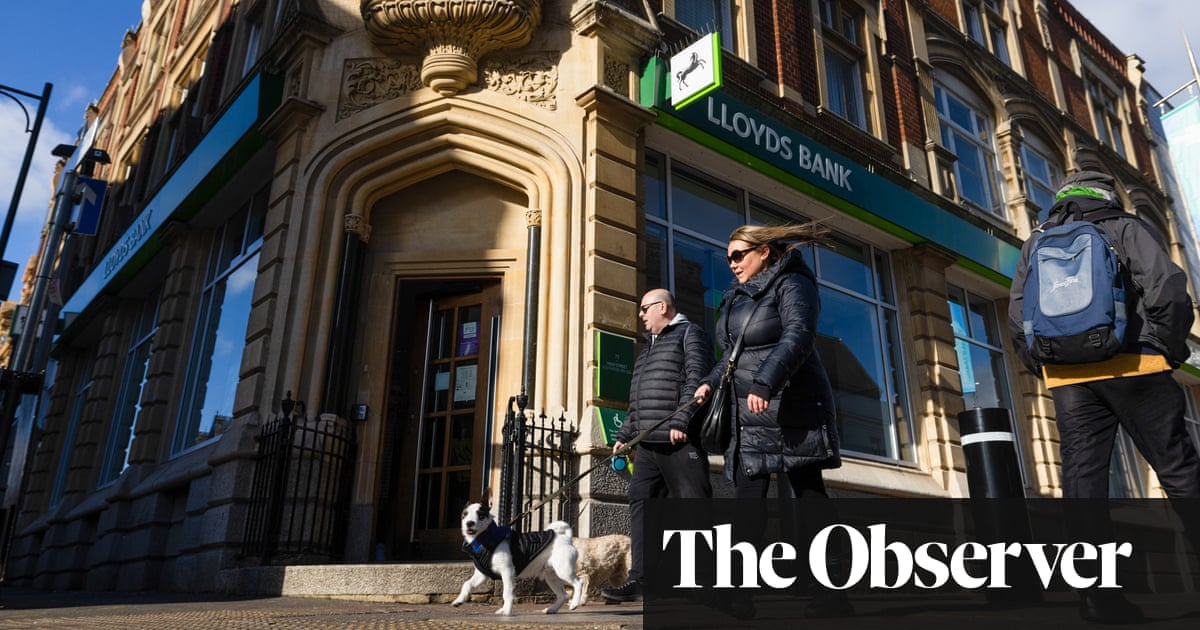Even a ‘rate shock’ for British mortgage borrowers may not help the banks

Mortgage borrowers who had been holding out for more affordable rates had their hopes dashed last week, as disappointing economic data raised the likelihood of borrowing costs staying higher for longer.
A drop in the annual rate of inflation to 3.2% in March fell only just short of City expectations for a drop to 3.1%, but that was enough to prompt investors to trim their bets on an imminent cut to interest rates. Financial markets, which had until recently been pricing in a first interest rate cut by the Bank of England in June, are now forecasting that the first reduction may not come until September or November.
That could prove too late for many of the 1.6 million mortgage borrowers who, according to the industry association UK Finance, are due to roll off cheaper fixed-rate mortgages and on to higher rates this year.
“They will face a rate shock,” said Charles Roe, UK Finance’s director of mortgages. Households whose monthly payments were priced against sub-1% interest rates just a few years ago will be facing higher payments linked to the current 5.25% base rate. And that will leave many borrowers with a choice: fix now, or take a gamble on a floating rate in hopes of the Bank of England taking action by the end of the year.
On the bright side, Roe says, most reversion rates – on to which borrowers will move if they decide against signing on to a new fixed term – are much lower than the near-10% rates being set for some new mortgages this year. Furthermore, lenders will have made sure borrowers could afford higher repayments.
But the bad news is that even if policymakers cut rates this year, this is unlikely to make a significant dent in near-term borrowing costs.
Chris Sykes, technical director at mortgage broker Private Finance, said most lenders were already pricing in, and passing on, the drop in base rates expected over the next two to five years. “It may reduce rates slightly after the first drop, as the prospect of a drop becomes a reality, but doesn’t mean it will be large,” Sykes said. “Hopefully, in 18 months’ to two years’ time, we are in a slightly lower-rate environment. But predictions are lots of mortgages will still be in the 4% [range] as ‘the new normal’.”
Higher interest rates have tended to be good news for lenders, which are able to charge more for loans and mortgages, and so increase their revenues. But the benefits of that trend have started to wane. “The combination of competition, an apparent end to interest rate increases from the Bank of England, and political and public pressure, may mean the peak is already behind us for ‘net interest’ margins,” said Danni Hewson, head of financial analysis at AJ Bell.
“That will take a toll on profit,” Hewson said, setting the scene for a relatively disappointing set of first-quarter results due this week from the UK’s four largest banks.
after newsletter promotion
The country’s largest mortgage lender, Lloyds, will kick off earnings week on Wednesday, and is expected to reveal a 26% drop in pre-tax profits to £1.7bn for the three months to March. That reflects analysts’ expectations for a drop in net interest income, as well as a 15% rise in impairment charges to protect itself against a possible rise in defaults.
Investors will also want updates on the Financial Conduct Authority’s investigation into whether consumers have been charged inflated prices for car loans. Lloyds, which has the largest car loan division of the four, has already put aside £450m – far short of the £2bn that analysts believe it could be on the hook for.
Barclays will follow on Thursday with a forecast 15% drop in pre-tax profits to £2.2bn, despite what could be a strong performance from its investment bank.
“Investors will be hoping Barclays follows suit from its US peers, who have, by and large, reported improved performance from their investment banking divisions,” said Matt Britzman, an equity analyst at Hargreaves Lansdown. Goldman Sachs reported a 28% rise in first-quarter profits earlier this month.
NatWest, meanwhile, is expected to report a 30% drop in pre-tax profits on Friday, to £1.3bn. That could ultimately dampen returns for the government, as it plans to sell a portion of its 28.9% stake in the bank to retail investors this summer.
HSBC will round off earnings week on 30 April. While average analyst forecasts have yet to be released, investors are already steeled for a $1bn (£800m) hit to pre-tax earnings linked to the sale of HSBC’s business in Argentina, where it has been knocked by hyperinflation and volatile currency moves in recent years. “Investors will be hoping there are no more surprise writedowns on the cards,” Britzman said.
Related
Why investing in women is a vital next step for…
Get Nadine White's Race Report newsletter for a fresh perspective on the week's newsGet our free newsletter from The Independent's Race CorrespondentGet our fre
Business secretary signals major shift on electric car policy to…
In a determined effort to retain Nissan’s manufacturing presence in Britain, Business Secretary Jonathan Reynolds has vowed to implement “substantial c
Joint Statement: Business Secretary and Fujitsu Services Ltd
Business and Trade Secretary Jonathan Reynolds today (Friday 7 March) met chiefs for Fujitsu in Tokyo to begin talks over the cost of redress for victims of th
UK foreign secretary backs multilateral defence funding for Europe
UK foreign secretary David Lammy has said that a new multilateral fund will be needed to secure Europe’s defence as he confirmed that Britain is “open to”













